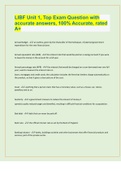Exam (elaborations)
LIBF Unit 1, Top Exam Question with accurate answers, 100% Accurate, rated A+
LIBF Unit 1, Top Exam Question with accurate answers, 100% Accurate, rated A+ Annual Budget - -an outline, given by the Chancellor of the Exchequer, of planned government expenditure for the next financial year. Annual equivalent rate (AER) - -the interest rate that would be paid on a savin...
[Show more]



